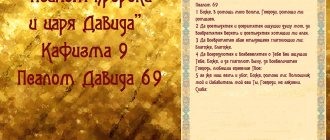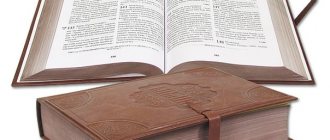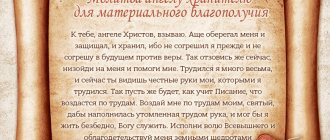In Dahl's dictionary
m. inspired song of David, one of the sacred songs that form part of the Old Testament. Psalms of David or Psalter, or Psalter vol. In separately printed psalters, psalms are mixed with prayers. And drunken Titus repeats psalms. | Psalter, a type of harp of the ancient Jews, which was accompanied by prayers and songs of praise to God. Psalterous, related to the psalter. Psalm, church psalmical, related to psalms. Psalmist m. writer, singer of psalms, David; the promoter of them. | Psalter. Psalm-reader, psalter-reader and psalter-reader m. -shchitsa f. cleric, equal in rank to sexton and sexton (personal honorary citizen), church reader; reading psalms for the departed. Psalmody, singing psalms. Psalmist singing psalms. | Writer of Psalms, David.
History of creation
The legendary Jewish king David reigned in the 11th–10th centuries. BC e. Inspired by the Holy Spirit, he wrote many psalms, which he sang during Jewish services. It is also known that David organized three choirs of singers and musicians, placing at their head people with outstanding musical and singing abilities - Asaph, Heman and Idithum.
A number of theologians consider King David to be the author of all psalms. Dissenters point out that some stories happened after his death. This objection can be refuted by David's gift of prophecy, which helped him see the future.
Davidic authorship is clearly indicated in the 73 Psalms. The rest also mention other authors, in particular the chief royal psalmist Asaph, the gatekeepers of the Jerusalem temple, called the “sons of Korah,” and the founder of Judaism, Moses. The Talmud adds other historical figures to its authors - Adam, Melchizedek, Abraham, Heman and Jedithum. The formation of the Psalter in its current form took several centuries.
The translation of the Psalter from Hebrew into ancient Greek was made in the 2nd century. BC e. This translation is usually called the Septuagint (“Translation of 70 interpreters (elders)”).
The first Slavic manuscripts of the Psalter appeared in the 9th century, and the first printed book appeared at the end of the 15th century. in Montenegro. In Rus', the Psalter, along with the primer and Book of Hours, gradually became a mandatory book for teaching literacy not only in the church, but also in the world. Many themes and quotations from the Psalter have entered literature and proverbs.
By the 16th–17th centuries. These include the first attempts to translate the Church Slavonic Psalter into the generally understandable Russian language, which were met with disapproval by the Russian Orthodox Church.
Psalms
Psalms in the Encyclopedic Dictionary: Psalms - (Greek psalmoi - song of praise) - chants that make up the Psalter; works of Jewish poetry; go back to King David (c. 1000 BC), and finally formed into an independent book towards the end. 5th - early 4th century. BC e. Together with the recitative tradition of performance (see Psalmody), they passed into Christian worship. Genre varieties of psalms: praise to God, prayer, heartfelt complaints and curses, historical reviews, marriage songs, philosophical meditation. Taken together, the psalms are characterized by an integrity of life perception, a commonality of themes and motives: the appeal of a person (or people) to God as a personal force, a persistent observer and listener, testing the depths of the human heart. Numerous arrangements of psalms are known in world poetry. In music of the 16th-20th centuries. the texts of the psalms formed the basis for compositions of various types (by J. Palestrina, G. Schütz, J. S. Bach, F. Schubert, F. Liszt, J. Brahms, I. F. Stravinsky, K. Penderecki).
Definition of the word "Psalms" according to TSB: Psalms
- Psalter, Psalter (Greek psalmуi; Hebrew name P. tegilim - praise; psalter, Greek psalterion - the name of a stringed musical instrument), works of Jewish religious lyrics. The term "P." (or "Psalter") is usually applied to the collection of 150 t. David P., which opens the 3rd section of the Old Testament canon of the Bible. This collection was compiled for the needs of the Jerusalem temple cult, apparently in the post-Babylonian era (that is, not earlier than the 6th century BC), but also includes earlier texts. The numbering of P. is different in the Jewish (so-called Masoretic) text of the Bible (which is followed by the Protestant tradition) and in the ancient Greek translation of the Septuagint (which is followed by the Orthodox and Catholic traditions; double numbering is given below). The poetic form and metrical organization of poetry is based on syntactic parallelism; the latter unites either synonymous variations of the same thought, or a general thought and its specification, or two opposing thoughts, or, finally, two statements that are in an ascending gradation relationship. In terms of content, P.’s collection reveals a number of genre varieties: along with cult praises of the god Yahweh, there are prayers (6/6, 51/50), heartfelt complaints (44/43, 102/101) and curses (58/57, 109/108 ), historical reviews (106/105) and even a marriage song (45/44, cf. Song of Songs). Some P. are distinguished by their philosophically meditative character; this is P. 8/8, containing theological reflections on the greatness of man. However, the Psalter, as an integral biblical book, is characterized by a unity of life perception, a commonality of religious themes and motives: the appeal of a person (or people) to God as a personal force, a persistent observer and listener, testing the depths of the human heart. P. as a literary genre are in line with the general development of Middle Eastern lyrics (P. 104/103 is close to the Egyptian hymns to the Sun of the era of Akhenaten), but stand out for their sharply personal character. The genre of P. was developed in Jewish literature later (the so-called Solomon P., 1st century BC). P. had a huge influence on folklore and served as the source of many proverbs. In the Middle Ages, the Psalter was the main educational book for mastering literacy. Apparently translated into Old Church Slavonic by Methodius (9th century); known in ancient Russian lists from the 11th century; widely reflected in writing (the chronicle of Nestor, the works of Theodosius of Pechersk, Hilarion, Cyril of Turov, Serapion of Vladimir, etc.). P.'s adaptations were very common, including in Russian poetry of the 18th and 19th centuries. (M. V. Lomonosov, G. R. Derzhavin, F. N. Glinka, N. M. Yazykov, A. S. Khomyakov). In the Jewish cult, prayers were performed in the form of hymn-like chants with accompaniment. For each P., as a rule, the method of performance and the “model” were indicated, that is, the corresponding tune. The Psalter occupied an important place in Christian worship. P. were performed during divine services and home prayers. Initially, they were sung by the whole community in church. The singing was more often responsive - the singer sang P.’s poems, and the community sang the refrain, sometimes antiphonally (see Antiphon). In the 4th century. singing by P. ensembles - children's, men's, women's - also became common practice. The performances were performed A cappella, only in a home environment the use of instruments was allowed. The type of performance was recitative-psalmodic (see Psalmody). In addition to whole poems, individual, most expressive verses from them were also used. On this basis, independent chants arose - antiphon, gradual, tractus and hallelujah. In the 15th century Polyphonic arrangements of P also appeared. Initially in Italy they were maintained in a simple homophonic warehouse, which soon took the form of Faubourdon, which retained its significance in European countries for several centuries. The juxtaposition of choirs, soloist and choir was used; instruments began to be used, the musical fabric itself became polyphonic. Around 1500, polyphonic musical incarnations of P. appeared. About 20 4-voice P. were left by Josquin des Pres (Netherlands); they became models for other composers. From the 15th century In music, polychorany and more complex polyphony are used, instruments are widely used, and concert style techniques are used. The development of music was greatly influenced by the works in this genre of Italian composers G. Gabrieli and C. Monteverdi. In France, its own type of poetry developed, in which the main attention was paid to the characteristics of the text; in England, poetry developed in the form of Enzema. Later, P.'s style of music became closer to the mass, motet, and cantata. Compositions based on P.'s texts or using their melodies were created by the composers Palestrina (Italy), O. Lasso (Netherlands), G. Schutz, J. S. Bach (under the name “motets”) (Germany), in the 19th and 20th centuries. — F. Schubert (Austria), F. Mendelssohn-Bartholdy, I. Brahms, M. Reger (Germany), F. Liszt and Z. Kodály (Hungary), A. Honegger (France), I. F. Stravinsky, etc. In the 16th century In connection with the Protestant movement, the so-called psalmodic song. The authors of such polyphonic songs based on P.'s texts were K. Gudimel and K. Le Jeune in France, M. Gomulka in Poland. In Russia, V.P. Titov set to music “The Rhymed Psalter” (1690) by Simeon of Polotsk. Lit.: Use of the book Psalter in the ancient life of the Russian people, in the collection: Orthodox Interlocutor, book 4, Kazan, 1857; Nikolsky N. M., King David and the Psalms, St. Petersburg, 1908; Rozov N., Old Russian miniaturist reading the psalter, in the book: Proceedings of the department. Old Russian Literature, vol. 22, M. - L., 1966; Uspensky N.D., Old Russian singing art, 2nd ed., M., 1971; Lods A., Histoire de la litt еrature hеbraique et juive depuis les origines jusqua la ruine de lеtat juif, P., 1950; EIIis P., The men and the message of the Old Testament, NY, 1963. S. S. Averintsev, N. D. Uspensky (about music).
Psalmody Psalms Psalm
Structure
Numbering
The division of the text into psalms and, naturally, their numbering differ in the Jewish (Masoretic) version of Tehillim and in the Greek translation of the Old Testament - the Septuagint. The Orthodox Church is based on Greek numbering. Catholics use both numberings, and Protestants use the Masoretic numbering.
Both versions of the Psalter contain 150 canonical psalms. Psalm 151 is found only in the Septuagint.
Kathismas
The Psalter is usually divided into 20 sections - kathisma (“seats” translated from Greek), while reading which you can sit in church. Another name is poetry. The Psalter is divided into kathismas so that they are of equal length. Since psalms are of different lengths, their number in kathismas also varies. In turn, each kathisma is divided into three sections, called glories from the praises raised between them. The numbers in the table below represent the division of the Psalter into kathismas.
| Kathisma | I Glory | II Glory | III Glory |
| I | 1–3 | 4–6 | 7–8 |
| II | 9–10 | 11–13 | 14–16 |
| III | 17 | 18–20 | 21–23 |
| IV | 24–26 | 27–29 | 30–31 |
| V | 32–33 | 34–35 | 36 |
| VI | 37–39 | 40–42 | 43–45 |
| VII | 46–48 | 49–50 | 51–54 |
| VIII | 55–57 | 58–60 | 61–63 |
| IX | 64–66 | 67 | 68–69 |
| X | 70–71 | 72–73 | 74–76 |
| XI | 77 | 78–80 | 81–84 |
| XII | 85–87 | 88 | 89–90 |
| XIII | 91–93 | 94–96 | 97–100 |
| XIV | 101–102 | 103 | 104 |
| XV | 105 | 106 | 107–108 |
| XVI | 109–111 | 112–114 | 115–117 |
| XVII | 118.1–72 | 118.73–131 | 118.132–176 |
| XVIII | 119–123 | 124–128 | 129–133 |
| IX | 134–136 | 137–139 | 140–142 |
| XX | 143–144 | 145–147 | 148–150 |
As you can see, the largest, the 118th, psalm occupies the entire 17th kathisma and, in turn, consists of 176 verses. The 18th kathisma contains the most psalms – 15.
Inscriptions
Inscriptions are usually called explanations contained in the psalms indicating the genre, authorship, technique and accompaniment of the performance of the psalms.
More than a third of the psalms indicate song (mismor in the Judeo-Aramaic original) as a genre. Psalms labeled as songs were sung without musical accompaniment. When specifying “psalm,” the accompaniment of the psaltery was implied. Other options are prayer (tefillah), praise (thilah). Other genre indications are interpreted tentatively. Thus, shigayon can mean both a type of melody and a musical instrument.
Mention of names does not necessarily indicate authorship. For example, the inscription “le-David” may indicate that the psalm written by another author is dedicated to David. There are direct indications of David's authorship in the 73 Psalms. Another frequently encountered inscription is “la-menaceah” (“to the end”). According to the prevailing opinion of experts, it means a reference to the leader (“chief” in the Synodal Version) of the choir of Levites who sang this psalm.
Inscriptions about technology and musical instruments are also perceived conditionally. The fact is that ancient melodic formulas are lost, and the correspondence between old and modern musical instruments is hypothetical. “Bi-nginot” and “al-neginat” are translated as “on strings”, “l ha-nhilot” - “on winds”. At the same time, “al-alamot” (“about the secret ones”) is freely interpreted in two ways – to perform the psalm in a high voice or to accompany it with a musical instrument in a high register.
Who is the author of the Psalter
The author of most psalms is traditionally considered to be the Hebrew king and prophet David, who lived 10 centuries before the birth of Christ. However, the composition of some psalms is attributed to Moses, Solomon and those close to King David.
The Psalms are considered examples of heartfelt, reverent, poetic prayer. Despite the general theme, the psalms can be divided into several genre categories. The Psalter contains psalms dedicated to the joyful glorification of God, and heartfelt prayer to Him, and expressions of gratitude. Some psalms can even be interpreted as historical overviews.
Content
The Psalter is a Jewish poem, the hymns of which are meaningfully related to each other. Along with the predominant glorification of God, these include supplications (6 and 50), lamentations (43 and 101), curses (57 and 108), a historical overview (105), and a love song (44).
The Psalter is characterized by a unity of perception of life and a commonality of religious themes, the aspiration of man and people to God as an observer and tester of the depths of the human heart.
The psalms are usually divided into three independent groups:
- laudably and gratefully;
- prayers;
- instructing.
Another group consists of prophetic-messianic hymns relating to the coming appearance of Christ. But it is not considered independent, since messianic elements are inherent in many psalms from other thematic groups.
Reading rules
In the Orthodox Church
In the Byzantine rite, many psalms are included in the daily circle of worship and, therefore, are read daily. These include:
- in Vespers, Psalm 103 is read sequentially, then 140, 141, 129, 116, then the 33rd;
- at the beginning of matins, six psalms from psalms 3, 37, 62, 87, 102, 142 are read, and at the end - psalms 148–150;
- the canon is preceded by the 50th psalm;
- Polyeleos - the solemn part of the festive matins, includes the singing of Psalms 134 and 135.
Most of the hours, interhours, Compline and Midnight Office are psalms. They are included in the Divine Liturgy and other prayer services.
Psalm 118 (“Immaculate”) is an indispensable attribute of funeral services. This huge psalm is read in full at the funeral service and on the eve of parental Saturdays.
Church sacraments are also accompanied by the singing of psalms. Psalm 31 is performed at baptism, Psalm 50 is performed before confession, and Psalm 127 is performed at church weddings.
In monasteries it is customary to read the entire Psalter in a week. At Matins, two, sometimes three kathismas are usually read (see above), and at Vespers - one. The scheme of the weekly circle of church reading of kathismas by numbers is as follows:
- Saturday (morning): 1;
- Sunday: 2, 3;
- Monday: 4–6;
- Tuesday: 7–9;
- Wednesday: 10–12;
- Thursday: 13–15;
- Friday: 19, 20, 18;
- Saturday (evening): 16, 17.
During Lent, kathismas are also read on the clock. True, these rules are strictly observed only in Orthodox monasteries, as well as in Old Believer communities. In large monasteries, the Incessant Psalter is practiced - its continuous reading by successive monks.
At home
Since the time of the first Christians, the Psalter has been widely used for home reading. Christians often knew the psalms by heart. The widespread dissemination of the Psalter even contributed to the study of literacy using it.
An obstacle to modern home reading of the Psalter may be the incomprehensibility of the Church Slavonic language. Many theologians, however, do not recommend using its Russian translation. They point out that only those made by St. Cyril and Methodius, the Church Slavonic translation is divinely inspired, and therefore contains mystical revelations and drives away evil spirits.
On the other hand, a complete rejection of the understandable Russian text can hardly be considered justified. The most reasonable thing is to combine both versions of the Psalter. This is greatly helped by publications in Church Slavonic with parallel translation into Russian.
Another obstacle is basic laziness, which is recommended to be overcome through training. Reading the Psalter should be started in small doses, for example, starting with one Glory, gradually increasing the duration of reading. The most important thing is to do this regularly. It is especially recommended to read Plasters during fasting.
You can read the Psalter at any time of the day, including at night. It is better to read it while standing in front of a burning candle or lamp. If necessary, it is not forbidden to do this while sitting, standing up while reading the initial and final prayers, and during glories. You can read aloud or in a low voice, making sure to pay attention to the accents. The psalms are read monotonously, without expression, slightly intoned, without theatrical pathos. Home reading of the Psalter should be preceded and concluded with special prayers.
Remembrance of health and peace
After reading each kathisma, you can pray for living and deceased relatives and loved ones. After the first glory, the living are remembered for their health, and after the second, the deceased are remembered.
At the tomb of a newly deceased Christian, before burial, the entire Psalter is supposed to be read. The invited priest spends at least 3–4 hours on this, during which evil spirits are driven away from the soul of the deceased. Some relatives order a full reading of the Psalter on the 40th day.
As stated above, the 17th kathisma with the 118th psalm is read only for the departed. In church services they are commemorated in its middle (“Wednesday”), and in home services - in all three glory.
What psalms and why should you read them?
According to the Monk Arsenius of Cappadocia (the confessor of Paisius the Holy Mountain), each psalm has a need assigned to it for which it is recommended to be read. A complete list of all psalms and their corresponding life situations is given on the website.
When and for whom should you not read the Psalter?
There is a period of ten days during which the Psalter cannot be read not only to the laity in private, but also to church ministers in churches. It begins on Maundy Thursday of Holy Week and continues throughout Bright Week. During these ten days, the book of Psalms is not read either in churches or in private.
You cannot read the Psalter for suicides. As for the unbaptized deceased and people of other faiths, cell readings for them at home are allowed.
Psalms related to the soul
If you know the psalms and their meaning, then the prayers will have a greater effect, since they will work in a targeted manner.
To do this, it is not necessary to read the entire Psalter. It is enough to know the right number for your situation. Using psalms for different occasions, you can protect yourself from enemies, heal your soul from sorrow, solve small long-standing everyday problems, and get rid of major ones. Chanted prayers help to avoid temptations and receive the power of God.
The following psalms are universally suitable for protecting the spiritual and subtle worlds from moral experiences:
Resist the demon, demons - Psalms 5 and 7.
Against extraneous anger and pride of people - Psalm 11.
In order not to succumb to other people’s unrighteous thoughts – 13.
Calming the offended – 19.
David’s prayer, recorded in the Psalter number 22, helps to strengthen one’s faith in the Almighty and that he helps one along the path.
Evade cunning nets and enemy captivity – 33.
Against evil injustice – 35.
Strengthen yourself before meeting the enemy – 38.
Will explain why you need to endure for those who are in a difficult situation - 39.
To receive pardon from sincere repentance - 50.
For those who wish to go to the House of God - 83.
Strengthens the spirit and hope in the Lord – 90.
When life is hard and your spirit is weak - 101.
Also, psalms can be thanksgiving, because you cannot only ask the Creator, you must thank him.
Help to thank you for your care:
P. 104, 106, 134, from 145 to 150 - teaching how to properly thank God.
P. 4, 45, 74, 114 - gratitude to the Lord, who heard the praying grieving soul.
P. 9, 17 - joy and gratitude for the happy deliverance from cruel people, tyrants.
You can not only read chanted prayers yourself, but also listen to them in a beautiful church performance.
The number of their applications and repetitions is unlimited.











